There's something about the very opening of a Mahler symphony which gives you an idea of how the rest of the performance will go. In the case of the Second, the inescapable "Resurrection", it's the ferocity behind the upper string tremolo and the wildness of the uprush from cellos and basses. To kick off the first full Tsinandali Festival in the wonderful part-open auditorium recently constructed on a country estate in Georgia's wine-growing district, there was that special shock of the new you only get from young players experiencing the work for the first time.
The Armenians, Azeris, Georgians, Kazakhs, Turks and Ukrainians of the brand-new Pan-Caucasian Youth Orchestra brought the fire; but there was also amazing sophistication, and that came mostly from a master conductor at the helm, Gianandrea Noseda, who after his years as Principal Guest Conductor of the Mariinsky Opera Orchestra now has the same role with the London Symphony Orchestra - where his concerts usually have an electrifying charge - and will become Music Director of the Zurich Opera starting in the 2021-22 season. He's inspiring in conversation, and you can see why the transfixing blue eyes are such an asset in his conducting (think of Reiner and Szell). We met the morning after the first big festival concert in the bizarre "secret room" of the hotel on the estate, entered through a revolving brick wall like something out of a production of Strauss's Elektra.
DAVID NICE Did you conduct this Mahler 'Resurrection' differently with this orchestra than you would have done if you were working with the LSO or other orchestras? In other words, is it still very much your interpretation or not?
GIANANDREA NOSEDA Probably my conception of the piece would not have been dramatically different, because that is the way I can put across the message of the symphony - even reading the score. The process to get to the result has been necessarily different, because of the way, say, the LSO players bring technical skills and musical maturity from minute one in the first rehearsal. The result of course with one of the greatest orchestras in the world, as I consider the LSO, probably also would have been different, but the process of four days of total immersion with the young artists of the Pan-Caucasian Youth Orchestra has been incredibly re-energising also for me. At the end of every rehearsal I was - dead. But somehow I could recharge the battery very quickly because of them. And that is both fantastic and fascinating. Also of course you know with Mahler Second it's almost impossible to have clarity from the first note to the last without small problems. But you have also to consider the overall performance, how it was something was special, and I will keep for a long time the memory of this performance. 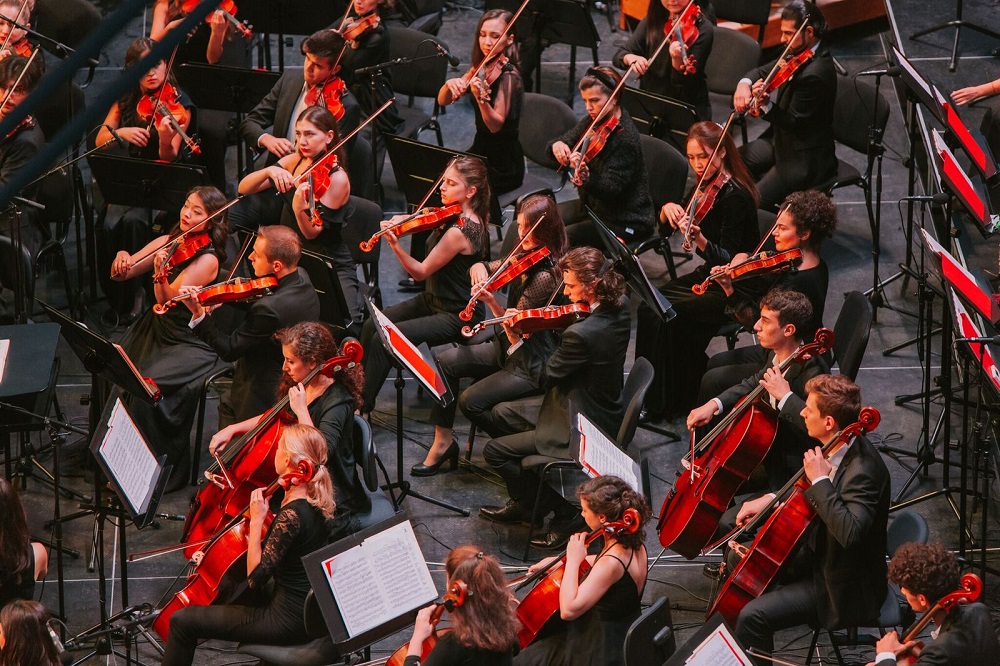 I spoke to some of the young players after the concert, and they had never played the work before. That must make such a difference to you, having worked with professional orchestras who will have performed it before, so this complete freshness and being totally in love with the work is something else. One of them said "I've played Wagner but Mahler is even harder and more wonderful..."
I spoke to some of the young players after the concert, and they had never played the work before. That must make such a difference to you, having worked with professional orchestras who will have performed it before, so this complete freshness and being totally in love with the work is something else. One of them said "I've played Wagner but Mahler is even harder and more wonderful..."
To have perceived this is incredible. Also because I myself wanted to start from an Everest of the symphonic repertoire. Not because I wanted to scare them, but to show what music can provide - big imagination. In one rehearsal I said, you've arrived here, you should just play, play, play, and you should reach the end of the symphony feeling that you are flying, like Icarus, you are on the top of the world...
And unlike Icarus you don't come down....
No, without the catastrophe. But to look at the world from above, you will not find differences between Armenia and Georgia and Turkey, because you are flying. You are much beyond this. This message of sharing our personal talent, serving the music, my talent helps your talent, and the other way round, and all together we just convey this emotion, brought in a message to the audience, and in fact they were able to stay concentrated for more than 80 minutes, that's extraordinary, because it's difficult for them to keep the concentration for long, not because of them but because of their lives, constantly reacting to things, emailing, social media, they are trained to react to information as it comes, but to impose your concentration in order to create an emotional journey, that has been something that took time for them to understand.. 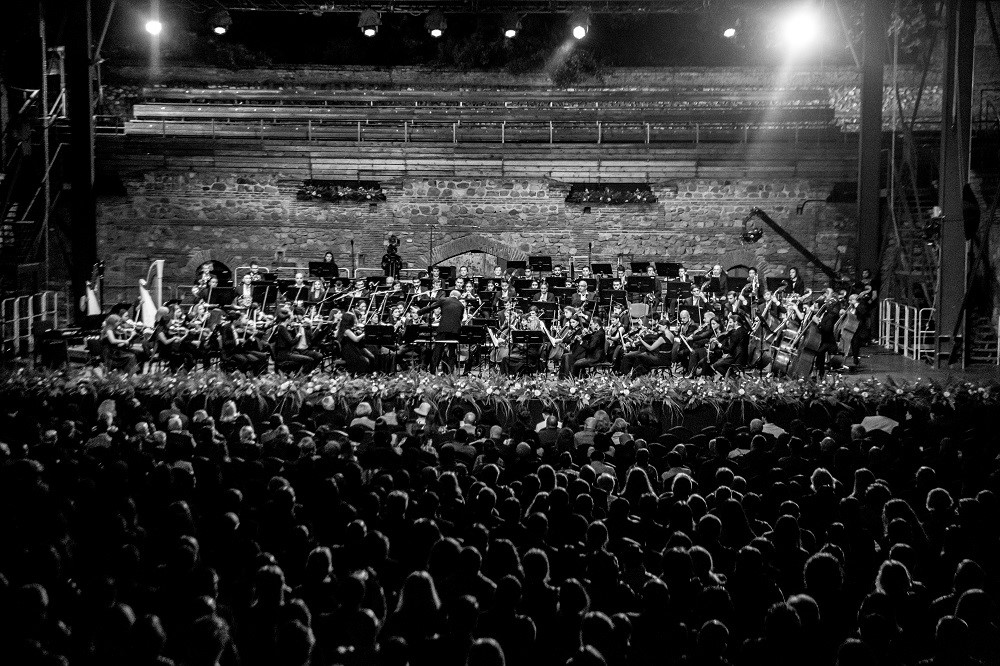 What was so exciting, from the very first minute, was that you could tell it was an orchestra that was thrilled - those first notes have to be like that, but quite often it's not..
What was so exciting, from the very first minute, was that you could tell it was an orchestra that was thrilled - those first notes have to be like that, but quite often it's not..
Because you take it for granted. For a professional orchestra, the risk is not to have any more the wonder of the surprise. OK, we know [sings], and the symphony's starting. But there is a very positive gesture there which is in a way revolutionary, and I felt very much the responsibility to write on white paper - as you said, they were completely fresh, they didn't have a clue about Mahler's Second Symphony. They arrived here on 16 August and through all the work of the coaches and the assistant conductors and Claudio [Vandelli, the assistant music director], they were prepared. I just arrived on the 4th and we were performing on the 8th.
And you were rehearsing the Symphonie Fantastique as well?
Yes, which we play on Thursday. I went through the first movement with them, after that I concentrated on the Mahler, tomorrow we will continue with the Fantastique..
What was also overwhelmingly wonderful was how sophisticated the string playing was. To get that cohesion in a very short space of time, partly through the coaches, but to have that level of dynamic subtlety and responsiveness...
That was our work in the last four days, And I have to say they took it very seriously. And of course because of what I told you earlier, the difficulty of keeping the concentration for long, by the end of three hours' rehearsal the attention level was going down, and I said to them no, when you are tired, it costs you more effort to stay attentive, it's in that moment that you have to deliver quality. And even if it cost them blood, they gave it to me, if you repeat one day, on the afternoon of the day it works, but the next day...so you have also to pass the information that to be an artist, to serve music is hard work. [Pictured below: Noseda outside the hall in conversation with festival founders and Artistic Directors Martin Engstroem and Avi Shoshani] 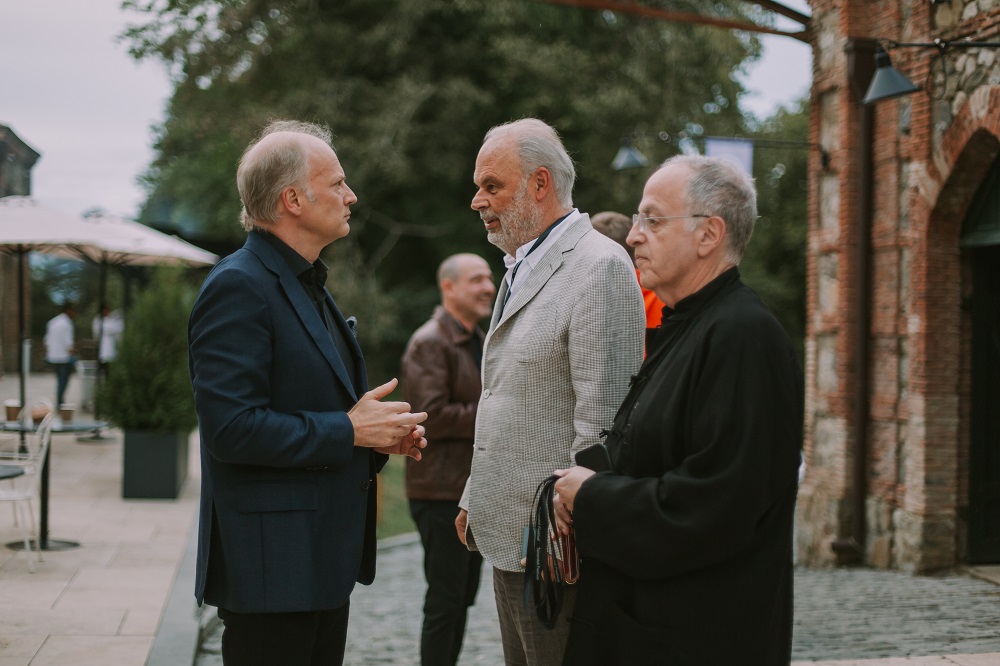 Did you talk to them much about the programme behind the symphony?
Did you talk to them much about the programme behind the symphony?
No, it's not interesting for them to have someone standing in front of them who gives a lecture. But in a rehearsal you can send signals, why he composed that, why he took this text for the ending of the symphony, why he was obsessed with the offstage banda [sings], to the effect that if you are crying some people will not care about you, they will continue their lives, and Mahler was sensitive about that, so when the banda comes you have to explain that - you have to give some inch of understanding..
Dramatic understanding - because it is like an opera for orchestra..
It is operatic. They were very open. Of course as I said they are like a blank sheet of paper, so can you imagine the responsibility to write on that paper, and how long they'll remember? So you cannot say stupid things or something that's not true. You don't want to joke with these kind of things.
Do you think there is a specific tonal colour that comes from players from these countries?
Absolutely, there is a human level of relationship that is not spoilt yet. It's like, in our countries you can eat tomatoes any time of the year. Here they still respect the seasons - you eat tomatoes only when it's the right time. It is still connected with the procession of the seasons, also it's respect in human relationships. Sometimes they can look a little bit severe, but actually if you open the door, they are ready to welcome you, and to welcome what you ask them to do. That's the thing about young musicians. So there is this element of human understanding and welcoming. Even more important in this part of the world, putting Armenians and Turks and Azeris together, with the history of the genocide, Ukraine, and so on. But if you want to change that without hiding their history, because they have to know it - I have to know the history of my country, how terrible it was in the 20th century with the Fascists, I have to know it, otherwise the risk is just to reproduce it again. But if I want to change and move on, I have to work with the youngsters. You have to know what is behind your shoulders, but you have to be able to open a new chapter.
Presumably there's less hostility between young people of different nations than there would be in the West-Eastern Divan Orchestra, where the problem is still present.
Exactly, it is the way you described it, it is a little bit less. But also the fact that I established that the language I was leading the rehearsal in was English. I realised immediately that some of the players couldn’t understand me in English. So my policy was, if you ask me something in the language you are more confident with, and that is Russian, I reacted in Russian, even in front of the rest of the orchestra, but I insisted that the rehearsal should be conducted in English. A couple of the players asked me questions in French, and I answered in French, but I said, let’s establish the language, not because I have a certain way of doing things, but immediately to communicate. And it was fantastic to see people just translating, helping each other. Fascinating.
I loved the pace of the first movement, because too often it sags or the second subject is pulled back.
By the way, Mahler was very meticulous with his instructions. In the first of the many suggestions or nbs for conductors, and he makes many in the score, under the first bar are written two things: under the pa-da-da-da-daa [cellos and basses ff, wild, in bar two] is written crotchet equals 144, metronomic note, which is double the tempo, which gives you the indication that the tempo is 72, and after the accelerando over the upward figure at th end of bar four you should reach the metronomic mark 92 – also instruction to conductors. With these three metronome marks – 72, 144, 92 – you can establish the first movement. There are two moments where he writes just ‘vorwarts’, at figures 12 and 20, and I think it sounds very compact like that, because when you’re slow it’s 72 – 66, when it’s fast it’s 120, but you feel the organic way. Maybe I’m wrong. But I thought it was a possible way. I guess conductors must conduct it how they feel, up to a point; for me, though, it coincides with what I like – when you have a Mahler first movement, particularly like the one in the Sixth, for example, it does need to move, and if you get tired out by the first movement, as an audience member, let alone as a player, you don’t concentrate so well…
I guess conductors must conduct it how they feel, up to a point; for me, though, it coincides with what I like – when you have a Mahler first movement, particularly like the one in the Sixth, for example, it does need to move, and if you get tired out by the first movement, as an audience member, let alone as a player, you don’t concentrate so well…
…for the rest. I put in the Sixth the scherzo in the second position [many conductors follow Mahler’s final thoughts that it should come third] and the Andante in the third, after that the long finale. I’m not now in the majority of conductors when I do that, but I think it makes strong sense because after you finish the first movement in Mahler Six and you don’t make a fermata, because it’s written attacca, you start [sings pounding rhythms of the scherzo], again with the A, it feels like a recapitulation of the first movement, one is in 4, the other in 3, you just change the tempo, but the effect is stupendous.
And the second themes in both movements – Alma, the children, if you accept a programme – are in the same keys too.
Absolutely. I always say you should tell a story as a performer. Whatever story, and maybe in the audience and among the players there will be a different story, but we as conductors should be narrators. And also I insisted to them, when you have a solo, you have to tell a story. Doesn’t matter if I get it or not, but tell something.
Your experience as an opera conductor would mean that woodwind phrase…
Vocalise, yes.
And you also had an attacca from the second movement of the “Resurrection” to the third, which is very refreshing. Because then you’ve got 2-3-4-5 all connected..
I couldn’t do the five minutes between the first and second movements as Mahler asked, but I made a pausa of two and a half minutes, but then in the minuet you finish – [sings last two notes and then the whipcrack of timpani t the start of the scherzo]
And they played the scherzo so well.
That is a devilish piece, not in terms of tempo but just in difficulty. We worked very hard. 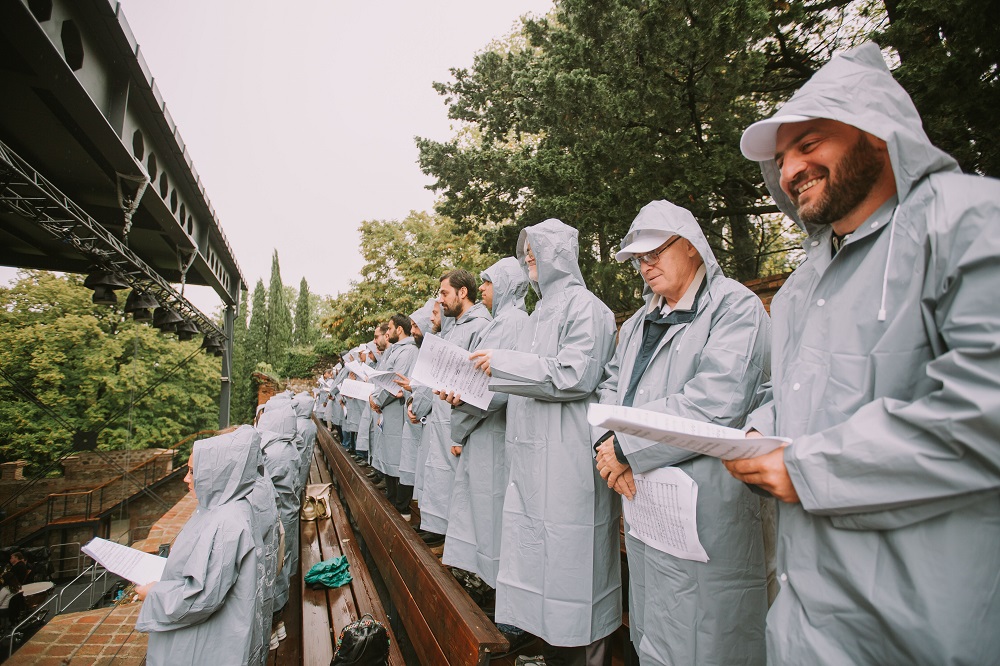 And nice to have a rich operatic chorus [pictured above in the morning's final rehearsal] .
And nice to have a rich operatic chorus [pictured above in the morning's final rehearsal] .
Oh, they were good.
For me the most magical moment was the soprano [the superb Ying Fang] rising out of the chorus, and that often doesn’t work, it’s so difficult.
Sometimes they put the chorus in the wrong relation to the singer, but to have this distance…because they start with the same line, and then the soprano breaks away. Generally, it’s been a good feeling. Not everything was perfect, I couldn’t expect that, but I think the story was narrated, it’s been properly told.
Probably not a lot of the audience would have known the story.
Very possible. But already if you react instinctively, it’s an achievement [pictured below, the Patriarch of Georgia and his entourage]. 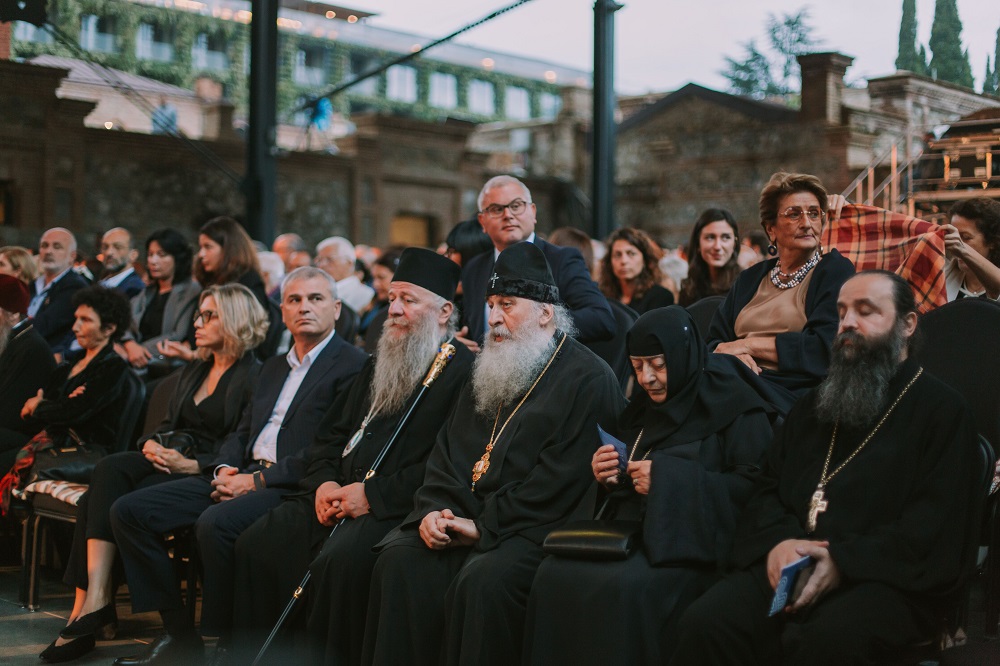 There was a family in front of me with children, incredibly intense.
There was a family in front of me with children, incredibly intense.
Wow. I think also the location is magic. It was a bit on the cold side.
Did the damp affect the instruments?
A bit. In the morning, when we did the general rehearsal, it was raining. So the strings couldn’t really make the pianissimi sound. But in the evening the percentage of humidity was not as dramatic as in the morning, it had stopped raining and it was not so bad.
How did you feel about the acoustics? The big explosions were so exciting. One felt you could be unbridled in all that.
The acoustics are good, yes, and without any kind of help. Those microphones were for Medici broadcasting, it’s completely natural. Actually from my position I lose a bit the woodwind, but I went down and the balance is perfect. Because in the first rehearsal, I asked for more from the woodwind, and I asked Claudio to take over the conducting while I went out to listen. Probably the podium is not the best place to judge.
It doesn’t always happen that conductors check the sound from out front. Nor directors, in opera productions, to make sure that everything can be seen from all parts of the house.
But you know, in the opera house, you can be sure that if you don’t hear the singer from the podium, the voice will certainly not be heard by the audience. Even in a big forte you must make sure not to lose the vocal line. That I learnt by experience.
The woodwind had this wonderful acerbic sound in unison.
They did well – some slips, of course. I was very positively surprised.
Were you involved in the whole formation of the orchestra from the start?
No. When I accepted to become the director of the festival and to conduct the youth orchestra, I asked Claudio Vandelli. We started together, so we’ve known each other since the 1990s – no, even before – scary! I probably sound a bit arrogant to say I trust most my own ears, but the second pair of ears I trust most are Claudio’s. So I said, Claudio, I cannot make the auditions. So he went to Ankara, to Yerevan, Tbilisi, Baku, Almaty, Ukraine. And when everyone arrived her on the 16th they made internal auditions to decide the positions, where everyone sat, so when I arrived, that was sorted. Also the coaches I took the resposibility for, people who have the same idea as I do about how music should be done, either because I worked with them at the Metropolitan Opera, Turin, the Concertgebouw, Spain or Sweden, and naturally the coaches formed such a strong relationship with the players, and the kids were so happy, they were so encouraging. It went incredibly well, beyond my expectation, and they prepared the maximum they could. 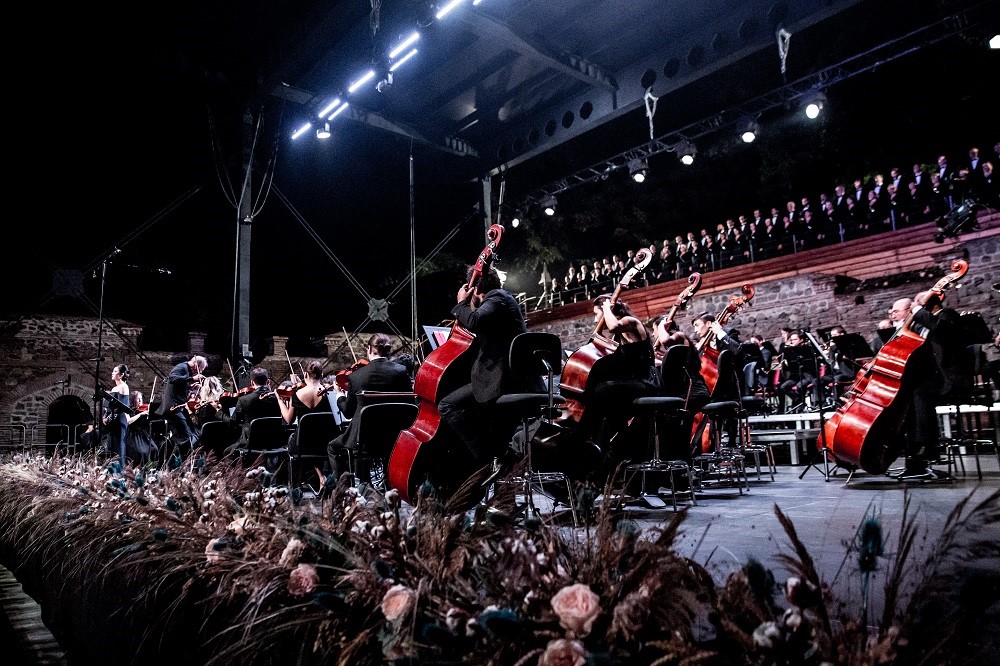 This is the core of great musicianship, that you find like minds in every orchestra you work with, who all know you. This is one of the most miraculous things, seeing musicians hooking up with each other. It’s particularly strong among the twentysomethings, how they have enterprise with their small groups, without sponsorship and using social media.
This is the core of great musicianship, that you find like minds in every orchestra you work with, who all know you. This is one of the most miraculous things, seeing musicians hooking up with each other. It’s particularly strong among the twentysomethings, how they have enterprise with their small groups, without sponsorship and using social media.
This has been a good experiment. Because some of these players knew each other, but some of them met here for the first time, but I knew people like Brendan [Kane, double-bass player also in the Verbier Festival Chamber Orchestra] and Nancy [Wu, violinist] from the Metropolitan Opera Orchestra who would find ways to communicate with others coming from Teatro Regio [Turin] or the Swedish Radio Symphony Orchestra. They are all good human beings, they live with the music and treat it like a story to be told to elevate people’s spirits. And that’s why you always have to be ready with your system, it supports what you want to say, not for its own sake.
It amazes me how strong the standards are, we’re used to our part of Europe but don’t know much beyond. Turkey especially has an incredibly strong standard of string playing, and until you go there you don’t know about it. Georgia we know more for theatre and choral singing, but there’s still good training here in the music conservatoires, surely?
There are many positive elements in this part of the world, not necessarily known beyond. There are incredible soloists from Georgia, instrumentalists like Lisa Batiashvili and Khatia Buniatishvili, singers like Anita Rachvelishvili, but it’s not something that immediately comes to your mind.
[Talking a bit about a British-based Armenian soprano, Anush Hovhannisyan, we cover the disaster that will befall the Brtish musical scene if freedom of movement around Europe ceases with Brexit; Noseda as Principal Guest Conductor of the LSO is well aware of it. Which leads me to ask about the elephant in the room in Georgia – Russia, where Noseda worked at the Mariinsky from 1997 to 2006.]
It’s a very sensitive issue. But it’s been interesting, because when I was rehearsing with the Tbilisi Opera Chorus two days ago, I went in front of them, I said in English, I’m so sorry, I cannot speak your language, they were ready to give me a translator from English to Georgian, and I said, if you like, I can speak in Italian or Russian, but not for political reaons, for art. And everyone told me, let’s speak in Russian. They said, dlya iskusstvo, nye budet problema, for art it’s not a problem.

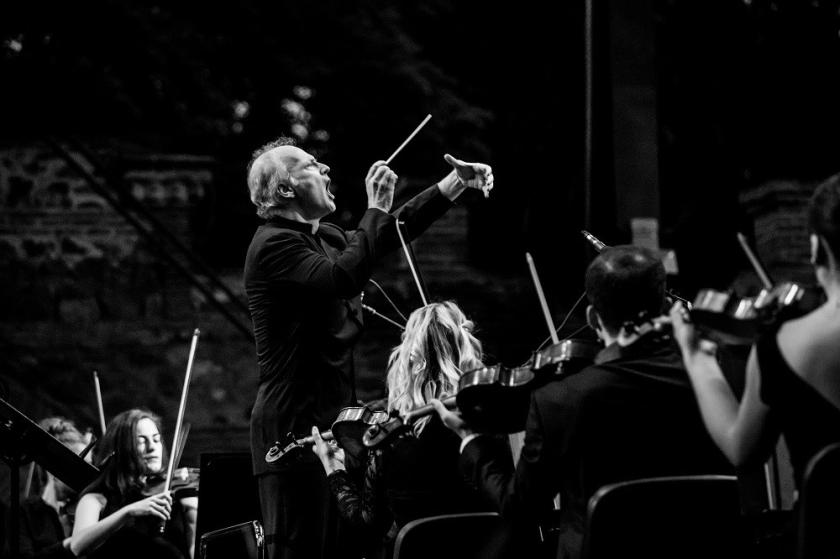












Add comment